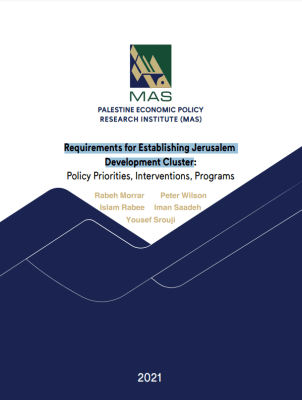Requirements for Establishing Jerusalem Development Cluster: Policy Priorities, Interventions, Programs
This study is the culmination of extensive research efforts conducted by MAS over the course of the current year, concerning topics and issues related to Jerusalem and the development of its economy. These topics and issues have been placed under our research microscope, such that MAS can examine them from various angles and aspects in cooperation with our partners, both official institutions and private sector organizations, including the PLO Negotiations Affairs Department and the Jerusalem Chamber of Commerce and Industry.
Within this research effort, MAS cooperated with the Ministry of Jerusalem Affairs to hold a series of consultative meetings with stakeholders and specialists that discussed, extensively and intensively, the possibility of achieving the objectives within each cluster proposed by the “Capital Development Cluster Plan”, and the available means for that. During these meetings, consultations were held on the mechanisms for activating the proposed clusters, for promoting action and cluster cooperation, and for the identification of feasible policy and program interventions considering the current conditions.
This study concludes that the cluster development strategy adopted by the Ministry in developing the Plan faces many challenges. Among the most important of them is the deterioration of the economic, political and social environment prevailing in Jerusalem, because of Israel’s occupation and the policy of Judaization and Israelization, through which Israel seeks to stifle the city's economy and comprehensively erase Arab-Palestinian identity. The study also found that the clusters proposed in the Plan do not, as yet, exist as tangible or systematic clusters in the city, with the exception of the inter-linked tourism and culture cluster. This implies that the Capital Development Cluster Plan is a supportive plan to promote the establishment of clusters, rather than a cluster-based plan. This is because most of the proposed projects are limited to infrastructural development, which alone is not sufficient to constitute a cluster-based project.
In light of this, the study recommends implementing the Plan within four clusters (housing and infrastructure, health, education, tourism and culture). Each of these clusters can implement and manage its own activities, in parallel with other clusters. This, in turn, requires cooperation between the various components of the cluster and relevant authorities. It is not possible to develop a sector in Jerusalem without meeting the requirements of all the components of that cluster, as well as defining the roles assigned to each party. In its chapters, the study presents a conception of the shape of the clusters and their work mechanisms, within the proposed sectors that were touched upon in the Plan. The study emphasizes the need for complementarity between clusters. That is, each cluster does not operate separately, but is in reality linked to other clusters via common workstreams.
The study recommends that, in order for each cluster to function effectively, it requires legislation and support. These are the task of regulatory authorities such as the Palestinian government and the relevant ministries (especially Ministry of Health, Ministry of Jerusalem Affairs, Ministry of Education, Ministry of Public Works and Housing, and Ministry of National Economy). For a cluster to operate effectively, members must have the necessary equipment, tools and resources, made available through supporting institutions that fulfill different roles based on their field of work, in conjunction with the need to provide necessary funding. Hence, the role of government, donors, banks and the private sector is above all to provide financial support to clusters.
MAS would like to thank the entire research team for their joint efforts in managing consultative sessions and drafting the chapters of this study.
These were prepared using a cumulative, participatory methodology, across the implementation period. MAS also thanks Jerusalemite personalities and institutions that cooperated with us and shared their opinions, information and experience, in order to enrich this study.
Finally, MAS extends its gratitude to the Arab Fund for Economic and Social Development for financing this study, and for its continuous support of MAS and its specialized role in the advancement and development of the Palestinian economy.

